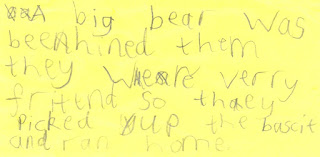My granddaughter, Elsie, aged 5 and a half, loves to write. Here is a little story she wrote on yellow stick-it sheets while we were visiting in July
While she does not know the spelling of some words, such as 'lady' and 'bush', she is pretty good at guessing, based on the pronunciation. And I have to admit that I had to look up 'raspberry' in a dictionary to find out how to spell it. (Why is there a 'p' in the middle?). Here is the second sheet.
Note that 'behind' and 'frightened' follow the pronunciation quite closely, even if they deviate from standard spelling. It is hardly surprising that she omits the slient 'gh' in 'frightened'.
One rule of phonics that she has not yet learned is that 'c' followed by 'e' or 'i' is always pronounced as /s/. No doubt she will learn this rule one day, and then she will no longer put a 'c' in 'basket'.
Here is the third sheet:
One other rule of phonics that she has not yet learned is that a short vowel, as in the first syllable of 'happened', needs to be followed by a doubled letter; on the basis of this rule, 'hapend' would be pronounced with /eɪ/ rather than /æ/. This is another rule that she will one day learn.
Here are the fourth and fifth sheets:
Overall, her spelling is pretty impressive, and she makes an excellent attempt to spell words that she does not know. At school, they are now taught phonics, and when she is reading, she is really good at sounding out words she has not seen before and guessing what they are. It seems that the teaching of phonics can be quite helpful in enabling children to read and write.






